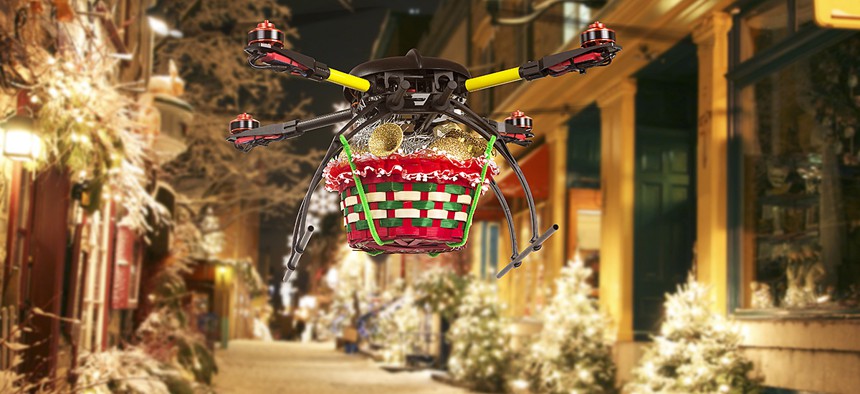Getting a Drone for Christmas? You’ll Have to Register with FAA Eventually

Alexander Kolomietz/Shutterstock.com
As many as 1 million people could receive drones as gifts.
With the holidays round the corner, as many as 1 million people could receive drones as gifts. That’s going to be a lot of drones vying for their piece of airspace. In a bid to mitigate any potential disasters, the U.S. government wants to have drone owners register their drones, and asked the Federal Aviation Administration to make recommendations on how to implement a registration system.
The FAA announced its recommendations Nov. 23rd, on how it, and a group of lawyers and businesses with interests in the drone industry, believes the U.S. should handle the registration of drones. They’re pretty reasonable.
Quartz has summarized the 17-page document for anyone who has a drone, or is looking to get into the hobby.
What drones need to be registered?
The FAA is recommending that all drones weighing over 250 grams (0.55 pounds) and less than 55 pounds need to be registered. That means almost all consumer drones on the market will have to be registered, but if you want to avoid the bureaucracy, you can get yourself a microdrone—a few of which Quartz profiled in its recent drone holiday guide.
It’s important to note, though, that it’s actually the pilot—rather than the drone—that needs to be registered. That means one person can actually own multiple drones, but only have to register with the FAA once.
After completing the registration, pilots will get a number that they can use for all the drones they fly—they just need to complete the registration before they fly a drone for the first time.
The FAA suggested that the current penalties for flying an unregistered aircraft—up to $25,000—are probably too severe for drone owners. That implies a lesser fine may be imposed for flying an unregistered drone, but it didn’t make any specific proposals on what the fine or penalty would be.
Who needs to register their drones?
Everyone in the U.S. that wants to fly a drone. The FAA recommended that drones should also only be flown by people over the age of 13. For tourists who want to come to the U.S. and fly drones, the FAA recommends still requiring them to register, but with an expedited application process.
The FAA said that “some sort of education component” should be built in to the registration process, referencing its current “Know Before You Fly” advertising campaign, but it wasn’t clear if they would require drone owners to pass any sort of test, or read any sort of literature, before flying their drone.
How will drones need to be registered?
The FAA is recommending that drone pilots register through a website, adding that the process should be free. The drone owner will have to put their name and address into the system, and will have the option to put in an email address, phone number, and the serial number of their drone. The FAA said that no information on a drone owner’s citizenship should be required, and the database of owners should be kept secret, recommending that it not ever be available through the Freedom of Information Act.
Drone owners will be given a number once their registration is complete, and will be required to mark that number prominently on their drone. According to the Wall Street Journal, one member of the FAA’s deliberation group said during proceedings: “You can put it in indelible ink, you can bedazzle it—it just needs to be legible so [authorities] are able to read it.”
If owners choose to register their drone’s serial number, however, the FAA said it didn’t think it would be necessary to write their registration number on the drone.
It’s currently unclear who would build the drone registration website, and the FAA wasn’t immediately available for comment on its recommendations.
When will drones need to be registered?
That’s not clear. The FAA is quiet on the subject of when it thinks the U.S. should start this registration process, or how it would plan on registering drones that are already in the homes of U.S. citizens. The Department of Transportation, which requested the FAA’s recommendations, also wasn’t available for comment. As of time publishing, there were only 31 days left until Christmas.
(Image via Alexander Kolomietz/Shutterstock.com)





